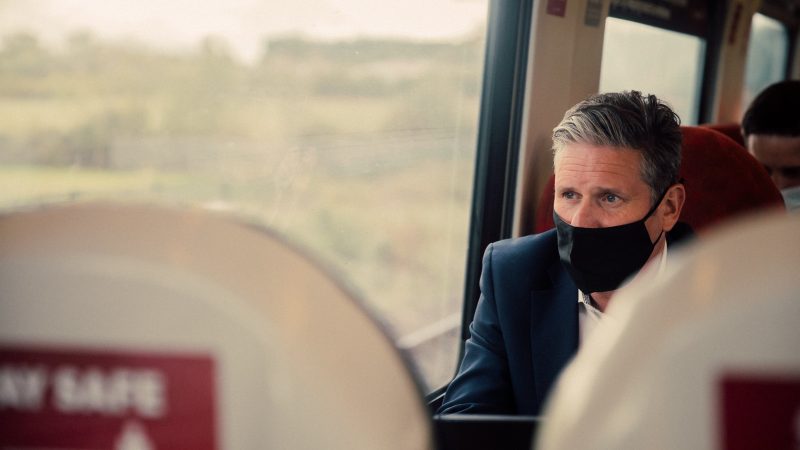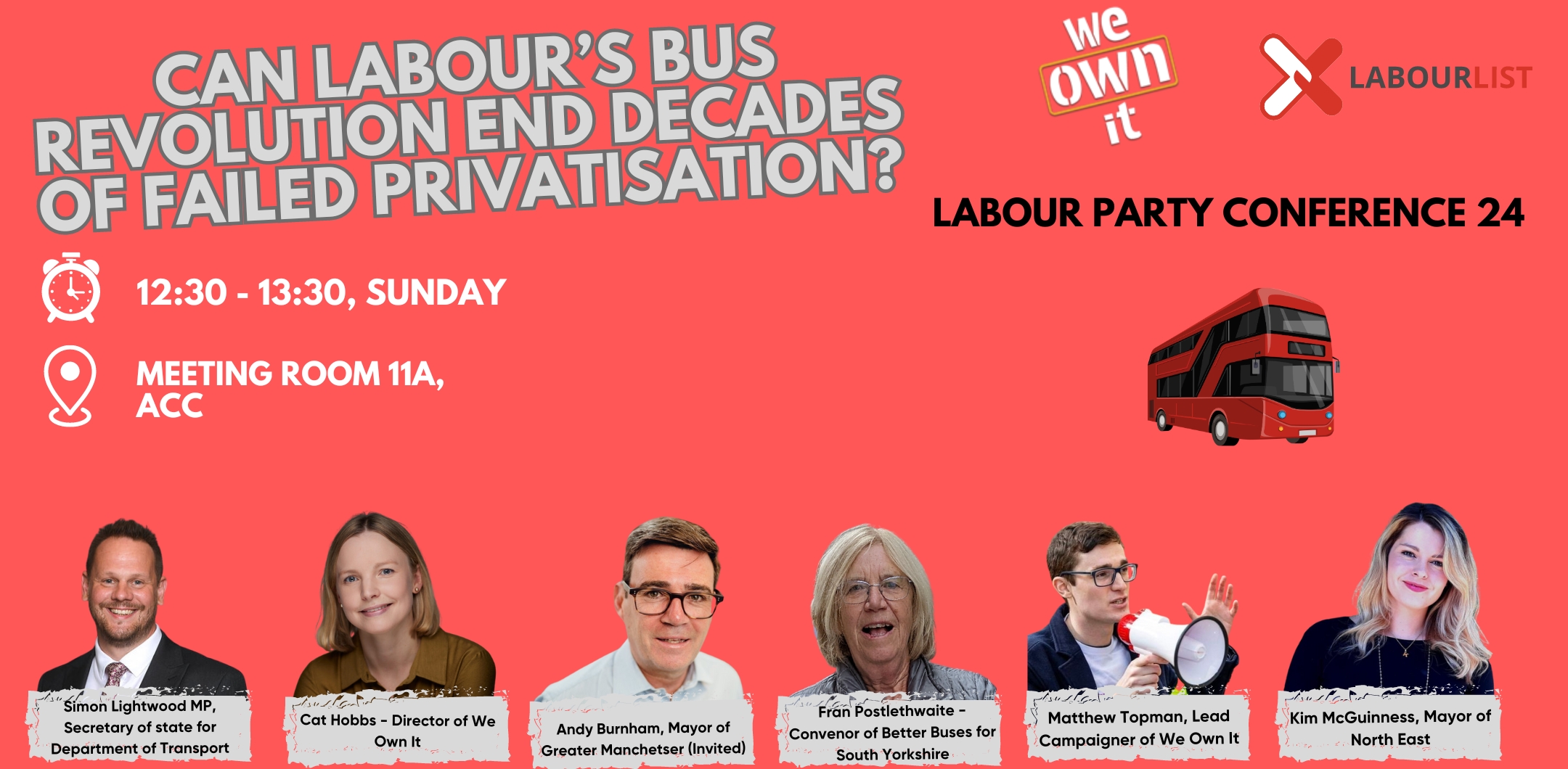
It’s hugely exciting to see the new government going full steam ahead with plans to bring rail franchises into public ownership, supported by 76% of the UK public.
Louise Haigh is moving fast and fixing the railway
Transport Secretary Louise Haigh confirmed this week that the Passenger Railways Services (Public Ownership) Bill has passed all its stages in parliament, and reiterated that her department will “move fast and fix things”.
Private companies have failed so badly that many franchises have already been brought into public hands – in Scotland and Wales and on the East Coast, Northern, Southeastern and Transpennine lines. From now on, ALL new contracts will come into public ownership as they expire.
This is a huge win, a recognition that rail privatisation has failed since the 90s. Bringing the whole network into public ownership will save around £1.5 billion that can be reinvested in better services.
Now it’s crucial that the government looks at how to make Great British Railways a raging success as the network gradually comes into public hands. There are three things that must happen to achieve this.
Bring the trains themselves into public ownership
Firstly, the government must tackle the question of rolling stock. Under current plans, the trains themselves will stay privately owned in what amounts to an ongoing racket. The biggest profits on the railway go to the rolling stock companies (the ROSCOs) which lease out the trains, and the biggest three have parent companies in low tax jurisdictions.
£2.7 billion has been paid in dividends to their owners in the last decade, according to the RMT. In 2020, the taxpayer underwrote dividends of £950 million. Around 13% of government funding for these companies is extracted in profit. This is hugely wasteful.
The government should look at building rolling stock directly in a publicly owned company so it doesn’t have to rely on these costly middle men. This would chime with Labour’s bold ambition to invest to boost jobs and tackle climate crisis.
Give passengers the power to elect their representatives
Secondly, the government must give passengers a real, democratic voice in the governance structures of Great British Railways. Louise Haigh has promised that passengers will be at the heart of the new railway, with a “powerful new passenger watchdog, the Passenger Standards Authority, to independently monitor standards and champion improvement in service performance”.
This authority should be a democratically elected body that passengers can vote for, not just another quango. Transport Focus already exists but doesn’t have much clout and dodges the issue of ownership which passengers care about.
Passengers need to feel that public ownership is a reality, not just rhetoric, that their views are taken into account. A West Yorkshire poll by Survation carried out for We Own It showed that 76% want community groups, drivers and local businesses to be represented on a transport board. Giving real power to passengers also fits with Sue Gray’s emphasis on citizens’ assemblies.
If passengers were organised into their own democratically accountable union or watchdog, they might make big demands, like asking for more funding to bring down fares or reopen lines. This is a risk government must take if it is serious about a railway which “relentlessly focuses on improving services for passengers”.
Invest in rail to reopen lines and bring down fares
The third issue is funding. Public ownership is a necessary but not sufficient condition for a successful railway. All excellent transport systems have a high level of government support and investment.
The government should invest to reduce fares and reopen lines. The UK has the highest fares in Europe for walk-on tickets on the day, making it hard for the railway to compete with the car. The TUC has found that rail fares have risen by 28% more than wages since 2010, and seasonal commuter tickets as a proportion of average wages are up to 7.5 times higher than in France, Germany, Belgium and Ireland.
The government must reduce fares to deliver on its modal shift targets to reduce emissions from transport.
The previous government set up a “Restoring Your Railway Fund” in 2020 to reopen lines and stations. Campaign for Better Transport called for this, to bring half a million people within walking distance of a train station, and allow an extra 20 million journeys a year. In just four years the fund has been hugely successful, reconnecting communities and enabling millions of train journeys.
READ MORE: Sign up to our must-read daily briefing email on all things Labour
The Dartmoor Line was fully restored in nine months and £10 million under budget, and now provides regular services. The restored Northumberland Line will bring passenger trains back between Ashington and Newcastle with six new railway stations from December 2024.
It’s truly shocking that the new Labour government has cancelled this fund, rowing back on the good decision by a Conservative government.
Every £1 invested in rail generates £2.50 of economic benefits, as Labour’s plan for rail itself highlights, so this is short sighted and misguided. It should be a no brainer to reopen railways for the benefit of communities and the economy. The government cannot use rail to “deliver on the mission to drive growth” without reinstating this fund.
The government must make sure public ownership is a huge success
Louise Haigh and the new government’s decision to bring rail franchises into public ownership is hugely welcome.
But this ambition and vision must go alongside funding to cut fares and invest in expanding services, a democratic voice for passengers and an industrial strategy that includes publicly owned rolling stock.
Without these policies, the new publicly owned railway will fail to fulfil its potential, and that represents a real risk for the new government.
SHARE: If you have anything to share that we should be looking into or publishing about this story – or any other topic involving Labour– contact us (strictly anonymously if you wish) at [email protected].
SUBSCRIBE: Sign up to LabourList’s morning email here for the best briefing on everything Labour, every weekday morning.
DONATE: If you value our work, please donate to become one of our supporters here and help sustain and expand our coverage.
PARTNER: If you or your organisation might be interested in partnering with us on sponsored events or content, email [email protected].





More from LabourList
Scottish Parliament elections 2026: Full list of Labour candidates for Holyrood
‘As metro mayors gain power, Labour must tighten political accountability’
Letters to the Editor – week ending 22 February 2026